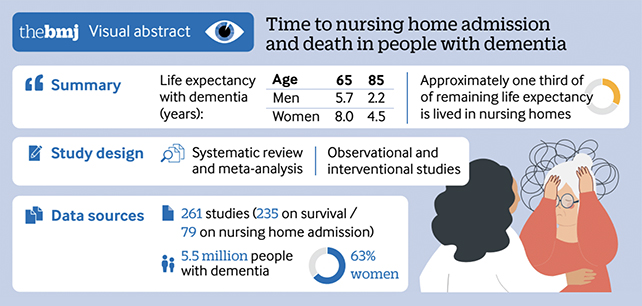Knowing how much time we have left with loved ones who have a terminal illness is vital for making informed choices.
A new analysis of 261 previous studies clarifies life expectancy statistics for individuals diagnosed with dementia, providing patients, families, and health authorities with a more individualized prognosis.
The reviewed studies included data on more than 5.5 million people in total, collected between 1984 and 2024, giving the research team from the Erasmus University Medical Centre in the Netherlands a vast set of figures across different countries in Europe, Asia, North and South America, and Oceania.
Life expectancy after a dementia diagnosis varies significantly depending on factors including the age at which the diagnosis is given, a person's gender, and the type of dementia being diagnosed, the researchers found.

The average life expectancy figures from diagnosis varied from 2.2 years for men diagnosed in their mid-80s, to 8.9 years for women diagnosed around the age of 60. Such a broad range of outcomes could affect all kinds of decisions about life planning and future care.
"Prognosis after a dementia diagnosis is highly dependent on personal and clinical characteristics, offering potential for individualised prognostic information and care planning," write the researchers in their published paper.
The findings also revealed a dementia diagnosis cuts life expectancy by two years at age 85, three to four years at age 80, and up to 13 years if you're diagnosed at 65.
Life expectancy tended to be higher in Asian populations, and for Alzheimer's compared to other types of dementia. What's more, the researchers found that the figures for life expectancy hadn't changed much over the decades covered in the study.
The team also looked at the time before someone was admitted to a nursing home after a diagnosis – though there was less consistent data available here, so these findings should be taken with more caution. On average, around a third of people find themselves in a nursing home within three years of a dementia diagnosis.
"In line with survival time, time to nursing home admission was shorter at older age and shorter for subtypes other than Alzheimer's disease," write the researchers.
"However, inference from these findings was hampered by lack of precision and methodological challenges."
With around 10 million people around the world receiving a dementia diagnosis every year, highly accurate information will be vital in providing sufficient care and support for those affected and their families. There hasn't been a comprehensive review like this for more than ten years, so an update was due – and there's lots more still to analyze.
"Future studies on individualized prognosis should ideally include patients at time of diagnosis, accounting for personal factors, social factors, disease stage, and comorbidity, while assessing relevant functional outcome measures above and beyond survival alone," write the researchers.
The research has been published in BMJ.